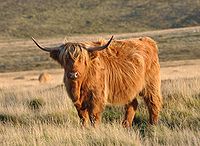
Photo from wikipedia
ABSTRACT The legendary Vechur cattle of Kerala, described as a very short breed, and the crossbred (CB) Sunandini cattle population exhibited great phenotypic variation; hence, the present study attempted to… Click to show full abstract
ABSTRACT The legendary Vechur cattle of Kerala, described as a very short breed, and the crossbred (CB) Sunandini cattle population exhibited great phenotypic variation; hence, the present study attempted to analyze the genetic diversity existing between them. A set of 14 polymorphic microsatellites were chosen from FAO-ISAG panel and amplified from genomic DNA isolated from blood samples of 30 Vechur and 64 unrelated crossbred cattle, using fluorescent labeled primers. Both populations revealed high genetic diversity as evidenced from high observed number of alleles, Polymorphic Information Content and expected heterozygosity. Observed heterozygosity was lesser (0.699) than expected (0.752) in Vechur population which was further supported by positive FIS value of 0.1149, indicating slight level of inbreeding in Vechur population. Overall, FST value was 0.065, which means genetic differentiation between crossbred and Vechur population was 6.5%, indicating that the crossbred cattle must have differentiated into a definite population that is different from the indigenous Vechur cows. Structure analysis indicated that the two populations showed distinct differences, with two underlying clusters. The present study supports the separation between Taurine and Zebu cattle and throws light onto the genetic diversity and relationship between native Vechur and crossbred cattle populations in Kerala state.
Journal Title: Animal Biotechnology
Year Published: 2018
Link to full text (if available)
Share on Social Media: Sign Up to like & get
recommendations!